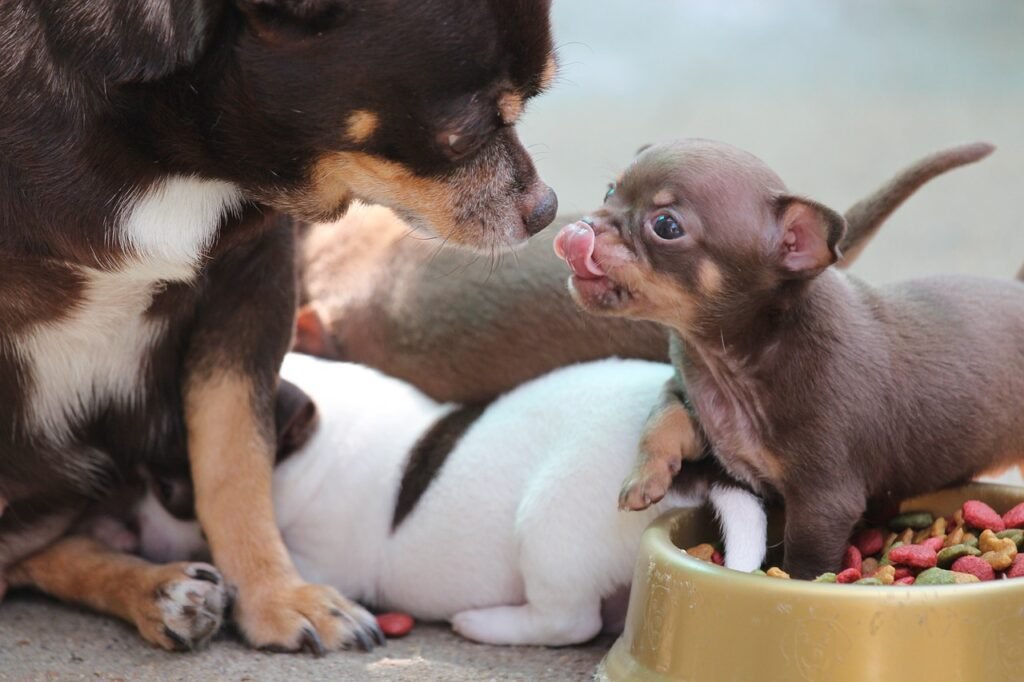How Many Puppies Will a Chihuahua Have? A Complete Guide to Chihuahua Litter Sizes and What to Expect
Chihuahuas, the tiny yet spirited dogs that steal hearts worldwide, are beloved pets known for their loyalty and feistiness.
If you’re a proud Chihuahua owner considering breeding, you might be wondering just how many puppies your little furball might have.
Understanding the factors influencing litter size and the care required during the breeding process is crucial. Let’s dive into the details.
Overview of Chihuahua Breed
Chihuahuas are the smallest dog breed in the world, weighing between 2 to 6 pounds.
Despite their small stature, they possess a big personality, often being described as courageous, lively, and alert.
Their compact size makes them perfect for apartment living, and their loyal nature endears them to families and singles alike.

How Many Puppies Will a Chihuahua Have?
Chihuahuas typically have small litters, ranging from one to three puppies on average. However, it’s not uncommon for a Chihuahua to have a litter size of four or five, though less frequent.
Factors such as genetics, age, health, and breeding method influence litter size. Providing proper care and nutrition during pregnancy is crucial for the health of both the mother and her puppies.
Regular veterinary check-ups can help monitor the pregnancy’s progress and address any potential complications.
Factors Affecting Litter Size
Genetics
Genetics significantly influences the litter size of Chihuahuas. The reproductive traits and tendencies are often inherited, meaning a Chihuahua that comes from a lineage known for larger litters is more likely to have a larger litter herself.
Genetic factors include the size, health, and reproductive history of both the dam (mother) and sire (father). Additionally, genetic conditions or predispositions can affect fertility and the overall health of the puppies.
Understanding the genetic background of both parents helps predict potential litter size and identify any hereditary health issues that might impact the pregnancy and the puppies.
Age of the Chihuahua
The age of the Chihuahua plays a crucial role in determining litter size. Younger Chihuahuas, especially those experiencing their first or second heat cycle, often have smaller litters due to their reproductive systems still maturing.
On the other hand, Chihuahuas that are too old might also have reduced litter sizes or face complications during pregnancy and birth.
Typically, the optimal breeding age for a Chihuahua is between 2 and 5 years, when they are fully mature but not yet facing the decline in fertility that comes with older age. Breeding within this age range helps ensure the health of both the mother and her puppies.
Health and Nutrition
Health and nutrition are vital factors in determining the litter size and overall health of a Chihuahua’s puppies.
A well-balanced diet rich in essential nutrients supports the mother’s reproductive system, improving her chances of conceiving and carrying a healthy litter. Proper nutrition during pregnancy helps ensure the puppies develop correctly and are born healthy.
Regular veterinary check-ups are essential to monitor the mother’s health, address any medical issues, and provide necessary supplements.
Maintaining an optimal weight and overall good health through proper diet and exercise increases the likelihood of a successful pregnancy and delivery, resulting in a healthy and potentially larger litter size.
Breeding Method
The breeding method used can significantly affect the litter size in Chihuahuas. Natural mating, where the male and female dogs mate naturally, often results in larger litters due to the direct and instinctive process.
However, artificial insemination is another method, especially useful if the dogs are geographically separated or if the male has difficulty mating naturally.
While artificial insemination can be effective, it sometimes results in smaller litters due to factors like timing accuracy and semen quality.
Regardless of the method, ensuring the health and compatibility of the breeding pair is crucial for optimizing litter size and ensuring the health of the puppies.
Typical Litter Size for Chihuahuas
Chihuahuas typically have small litters compared to large dog breeds. On average, a Chihuahua will give birth to one to three puppies per litter. Occasionally, a Chihuahua may have a litter of four to five puppies, but this is less common.
The small litter size is largely due to the breed’s petite body structure, which can only support a limited number of developing puppies. Additionally, first-time mothers often have smaller litters than more experienced ones.
Factors such as genetics, age, health, and nutrition also influence the number of puppies. Understanding and preparing for the typical litter size helps ensure proper care for both the mother and her newborns.
Pregnancy in Chihuahuas
Signs of Pregnancy
Recognizing the signs of pregnancy in a Chihuahua is essential for providing proper care. Early signs may include a slight increase in appetite and weight gain. Around three weeks into the pregnancy, you might notice the dog becoming more affectionate and seeking extra attention.
Some Chihuahuas experience morning sickness, which can result in decreased appetite and occasional vomiting. As the pregnancy progresses, the dog’s abdomen will visibly enlarge, and you might see changes in her nipples, which become larger and darker.
By the fourth or fifth week, the expectant mother may start nesting behavior, preparing a comfortable space for her puppies. Regular veterinary check-ups will confirm the pregnancy and ensure the health of both the mother and her developing puppies.
Duration of Pregnancy
The duration of pregnancy in Chihuahuas typically lasts around 63 days, though it can range from 58 to 68 days. During this period, it is crucial to provide the expectant mother with optimal care, including a balanced diet and regular veterinary check-ups.
The pregnancy is usually divided into three trimesters, each lasting about three weeks. In the first trimester, the embryos implant in the uterine wall. By the second trimester, the puppies’ development accelerates, and the mother’s belly begins to enlarge. The final trimester involves the puppies growing rapidly and preparing for birth.
Monitoring the Chihuahua’s health throughout the pregnancy ensures both the mother and her puppies remain healthy and ready for delivery.
Care During Pregnancy
Proper care during pregnancy is crucial for the health of a Chihuahua and her puppies. Start by ensuring she receives a balanced, nutritious diet rich in essential vitamins and minerals.
High-quality commercial dog food formulated for pregnant dogs or a vet-approved homemade diet works well. Regular veterinary check-ups are essential to monitor the pregnancy’s progress and address any health concerns.
Exercise should be moderate; gentle walks help maintain her fitness without overexertion. Keep her environment stress-free and comfortable, with a quiet, cozy space for rest. Avoid exposing her to sick animals and ensure she stays up-to-date on vaccinations and parasite prevention.

Birth and Delivery
Preparing for Delivery
Preparing for the delivery of your Chihuahua’s puppies is essential for a smooth and successful birthing process. Start by creating a clean, comfortable whelping area in a quiet, warm location away from household noise.
A whelping box with low sides and soft bedding provides a safe space for the mother and her newborns. Keep essential supplies handy, including clean towels, blankets, and a heat source such as a heating pad or heat lamp to maintain warmth for the puppies.
Familiarize yourself with the signs of labor, such as restlessness, nesting behavior, and a drop in body temperature. Monitor your Chihuahua closely as her due date approaches and be prepared to offer assistance if needed. Having a veterinarian’s contact information readily available ensures prompt medical attention in case of complications during delivery.
Signs of Labor
Signs that labor is imminent include restlessness, nesting behavior, and a drop in body temperature. She may also lose her appetite and become more clingy.
Assistance During Delivery
Most Chihuahuas can give birth without assistance, but it’s essential to be prepared. Have your vet’s contact information handy in case of complications, and be ready to assist if needed by providing a clean towel and gentle encouragement.
Caring for Newborn Puppies
Immediate Post-Birth Care
Immediately after giving birth, your Chihuahua and her puppies will require special care to ensure their health and well-being. Allow the mother to rest and bond with her puppies in a quiet, warm environment.
Check each puppy to ensure they are breathing and are not cold. If a puppy appears weak or unresponsive, gently stimulate it by rubbing it with a clean, dry towel.
Ensure each puppy is nursing properly and receiving adequate colostrum, the nutrient-rich first milk that provides essential antibodies.
Feeding and Nutrition
Puppies should be nursing frequently in the first few weeks. If the mother has difficulty producing enough milk, consult your vet about supplementing with puppy formula.
Health Checks
Regular health checks are vital to ensure the puppies are developing correctly. Monitor their weight gain, activity levels, and look out for any signs of illness.
Common Issues and Complications
Small Litter Sizes
Small litter sizes are a common occurrence in Chihuahuas and can be influenced by various factors. Genetics plays a significant role, as some Chihuahuas may inherit traits for smaller litters from their parents.
Additionally, the age and health of the mother can impact litter size, with older or unhealthy dogs often having smaller litters. Breeding pairs that are closely related may also produce smaller litters due to genetic factors.
Environmental factors, such as stress or inadequate nutrition during pregnancy, can further contribute to smaller litter sizes. While small litters are not necessarily a cause for concern, it’s essential to monitor the health and development of each puppy closely.
Providing proper care and nutrition can help ensure the health and well-being of both the mother and her puppies. If you have concerns about your Chihuahua’s litter size or the health of her puppies, consult with your veterinarian for guidance and support.
Health Complications
Health complications during pregnancy and birth can arise in Chihuahuas, requiring careful monitoring and prompt veterinary intervention. One common issue is dystocia, which refers to difficult or obstructed labor.
This can occur if the puppies are too large to pass through the birth canal or if the mother is unable to effectively expel them. Dystocia can lead to distress for both the mother and her puppies and requires immediate veterinary attention to avoid complications.
Other health concerns may include infections, hemorrhaging, or issues with the placenta. Regular prenatal check-ups with a veterinarian can help identify and address any potential health complications early on, ensuring the safety and well-being of the mother and her puppies.
When to Call the Vet
If your Chihuahua shows signs of distress, prolonged labor, or if a puppy seems weak or unresponsive, contact your vet immediately. Prompt intervention can save lives.

Myths and Facts About Chihuahua Litters
Common Misconceptions
A prevalent myth is that Chihuahuas can’t give birth naturally due to their size. While they are prone to complications, many Chihuahuas can and do give birth naturally with proper care.
Verified Facts
Chihuahuas generally have smaller litters due to their size. Proper prenatal care significantly increases the chances of a healthy pregnancy and delivery.
FAQs: Chihuahua
How can I ensure a healthy litter size?
Ensuring a healthy litter size involves proper nutrition, regular vet check-ups, and careful selection of the breeding pair based on health and genetic background.
What should I do if my Chihuahua has complications during birth?
Contact your vet immediately if your Chihuahua experiences complications such as prolonged labor or distress. Prompt medical assistance is critical.
Can the size of the litter affect the health of the puppies?
Yes, very small or large litters can sometimes lead to health issues. Single puppies might be larger, causing birth complications, while very large litters can lead to weaker puppies.
How often can I breed my Chihuahua?
It’s recommended to breed a Chihuahua no more than once a year to allow adequate recovery time between pregnancies and ensure the health of the mother.
Are there any special care instructions for pregnant Chihuahuas?
Yes, provide balanced nutrition, ensure regular vet visits, avoid stress, and create a comfortable environment for your pregnant Chihuahua to ensure her health and the health of her puppies.
Conclusion
Breeding Chihuahuas requires careful consideration and preparation. Understanding the factors affecting litter size, providing excellent care during pregnancy, and being prepared for delivery are key to ensuring a healthy mother and puppies.
While the typical litter size is small, each puppy brings joy and adds to the unique charm of the Chihuahua breed.





